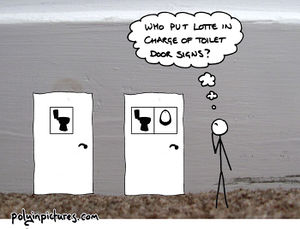Public toilets: Difference between revisions
m (1 revision imported: import from nonbinary.wiki) |
imported>NbwikiUploadBot m (→See also: removing import tag) |
||
| Line 19: | Line 19: | ||
[[Category:Practical resources]] | [[Category:Practical resources]] | ||
Revision as of 11:52, 7 February 2019
| |
This article is a stub. You can help the Nonbinary wiki by expanding it! Note to editors: remember to always support the information you proved with external references! |
Public toilets are a potentially dysphoric issue with nonbinary people, as restrooms for able-bodied people are often assigned to male and female, with little to no provision for people who don't fit the gender binary.
Resources
How to find non-binary public toilets, and how to handle situations where genderfree toilets aren't available.
- Refuge Restrooms is a replacement for Safe2pee. It also has an iOS app available.
- Safe2pee is a crowdsourced world map of public toilets that are genderfree and/or accessible. There is an iPhone app that uses the information so that you can find places when you're out and about, called Transquat.
Commentary on public toilets and gender
- Go Where? is an article on the gendering of public toilets, looking into the visual symbols and what they say about language and public perception of gender.
- "Renaming the bathrooms: A cruel trick for queer ends," by androgyne Raphael Carter regarding a practical joke.

